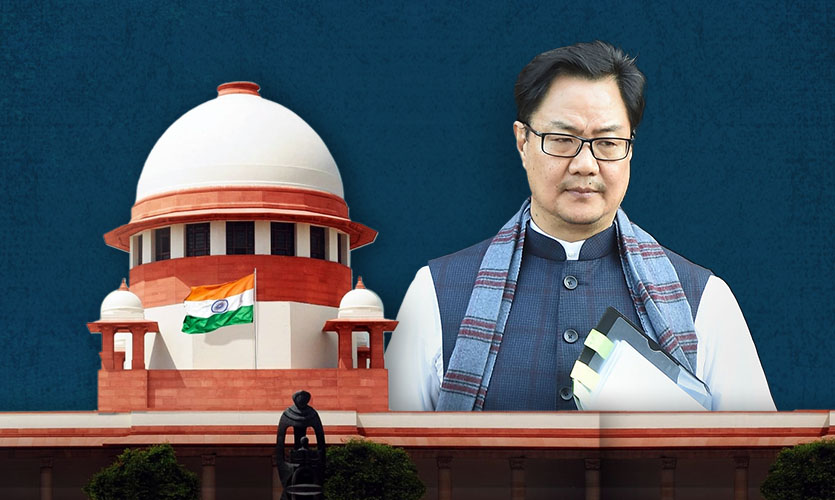The standoff between the Supreme Court and the Union government on the collegium system for the appointment of judges of the High Courts intensified this week.
Putting on hold the top court’s recommendations, the Centre has returned 19 out of 21 names of the judges suggested, and urged the Supreme Court to reconsider.
According to the Indian Express, the Centre has strongly objected to the recommendation list, saying that 11 of them were new, and 10 have been reiterated by the apex court’s collegium system. Of the 10 returned, five were for elevation to the Allahabad High Court, two each for Calcutta and Kerala, and one for the Karnataka High Court. The Centre, on Tuesday, said that it has approved only two names that were recommended for the Bombay High Court.
Earlier, the Supreme Court had criticised Union Law Minister Kiren Rijiju for not approving the recommended names. The Court had further observed that the government is influencing the appointment process by not taking a decision on the names sent by the collegium system.
The top court also asked the Attorney General of India and the Solicitor General to ensure that the law of the land laid down by this court is followed.
The Court had reacted after Rijiju criticised the collegium system, and called it alien to the Constitution. The law minister had asked what is the role of the government if the list of judges is already approved by the collegium system.
“As long as this (Collegium) system is prevailing we will respect it. But if you expect that (the) government should merely sign every recommendation, then what is the role of the government,” asked Rijiju while speaking at a Times Now event.
He further claimed that there are loopholes in the collegium system, and that people think the mechanism of appointment of judges in courts is not transparent.
Taking a jibe at the Supreme Court, Rijiju commented, “Don’t send the files to the government. You appoint yourself and you run the show.”
Replying to the law minister’s comments on the collegium system, a bench of Justice Sanjay Kishan Kaul and Justice Abhay S Oka said, “When a person sitting in such a high position says that we should do this work ourselves, then we will do this work ourselves. We have no problem in this. This statement is coming from someone in a very high position. All we can say is that this should not happen.”
“You can’t hold them. This is not acceptable. The decision on many names is pending for more than 1.5 years. How can you say that you cannot decide on names? We are telling you that by keeping the names pending like this, you are crossing the limits from which return is not possible,” said the Supreme Court, hitting out at the Rijiju’s objections to the collegium system.
A “Time-Tested” System
Senior Congress leader and former law minister M Veerappa Moily criticised Rijiju for his remark on the collegium system.
Moily said that Rijiju’s statement was against the law, and as a minister, ‘challenging’ the highest court does not suit him. He also urged Prime Minister Narendra Modi to sack Rijiju for his “bizarre” comment on the collegium system.
“The collegium system is time-tested and every citizen or even the government has no other option but to abide by the law laid down by the Supreme Court. The ironical comment of the law minister on the matter of appointment of judges is in total defiance of the law of the land,” said the Congress leader.
What Is The Collegium System?
The Chief Justice Of India (CJI) and four other senior most judges at the Supreme Court lead the collegium system for appointments and transfers. Likewise, a High Court collegium is headed by its Chief Justice and four other senior-most judges of that court.
Under this system, the government plays only a ‘rubber-stamp’ role where either it has to sign on the collegium file, or send back for reconsideration the list recommended by the top judges of the Supreme Court; although it cannot recommend the names.
In 1993, the Supreme Court had categorically said that the appointment of the judges should be under the watch of the CJI. Justice (Retd.) NV Ramana, during his term as CJI, had defended the collegium system of appointing judges, asserting that the selection process “could not be more democratic than this”.
Critics of the collegium system and those who do not like the current mechanism of appointment of judges in the Indian judiciary believe that the system is opaque and lacks transparency. According to some, the current system not only supports the scope for nepotism but also overlooks several talented junior judges and advocates in appointments.
The Modi government had brought the National Judicial Appointments Commission (NJAC) Act in 2014, but it was struck down by the Supreme Court, citing that the NJAC was against the basic structure of the Constitution.
Sticking with the collegium system, it seems evident that the Supreme Court does not want to share its power with anyone in terms of the selection of the judges. On the other hand, the Centre, citing the Constitution, is putting on hold the top court’s recommendations for as long as possible, maintaining a stalemate situation.
Read more: Centre Defends CAA In Affidavit, Urges SC To Dismiss Pleas Challenging ‘Benign’ Law










